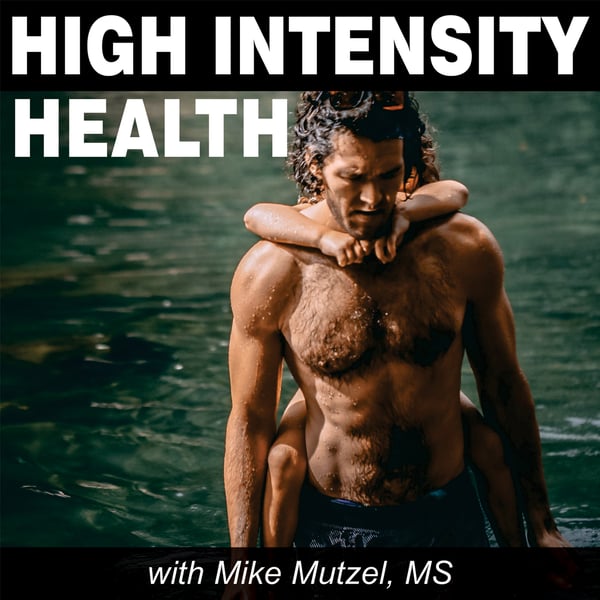Cholesterol-Rich Foods (Eggs) Have Minimal Impact on Your LDL 'Bad' Cholesterol
High Intensity Health with Mike Mutzel, MS
Mike Mutzel
4.8 • 1.2K Ratings
🗓️ 17 March 2023
⏱️ 22 minutes
🧾️ Download transcript
Summary
After years of demonizing dietary cholesterol, the consensus in the medical community is finally shifting: cholesterol-rich foods have a minimal impact on serum LDL or total cholesterol.
Support your Intermittent Fasting lifestyle with the updated Berberine HCl Fasting Accelerator by MYOXCIENCE: https://bit.ly/berberine-fasting-accelerator
Use code podcast at checkout to save
Link to research and video: https://bit.ly/3TlMQ0J
---------------------------Show Notes-----------------------
0:00 Intro
1:10 Insulin regulates the enzyme that synthesizes endogenous cholesterol.
1:50 Dietary cholesterol does not have a significant impact on serum cholesterol.
2:45 Carbohydrates increase LDL and total cholesterol and insulin.
3:30 Cholesterol has powerful benefits.
5:00 Low cholesterol diets can increase endogenous production of cholesterol and the expression of LDL receptors.
5:40 High cholesterol diet expresses fewer LDL receptors.
8:00 Eggs and meat consumption has a minimal impact on serum cholesterol.
8:53 Increased LDL cholesterol may be from of increased fat metabolism.
10:30 Type 2 diabetes and insulin resistance modifies LDL particles to be smaller and denser and more likely to become atherogenic.
13:50 Diabetes can be a side effect of Statin drugs.
14:20 Cholesterol is used to make bile.
16:20 A diet rich in seed oils may foster the modification of LDL cholesterol that can make the atherogenic.
17:45 LDL cholesterol has antiviral properties.
19:30 Insulin resistance and physical inactivity increase triglyceride production, leading to the formation of fats in the liver and elevated triglycerides and elevated vLDL cholesterol.
Transcript
Click on a timestamp to play from that location
| 0:00.0 | A client asked me the other day, Mike, if dietary cholesterol doesn't impact |
| 0:03.2 | serum cholesterol, what does? And so what I wanted to do is provide to you a |
| 0:06.7 | deep dive into the literature because many of you go to your doctor and your doctor |
| 0:10.2 | finds out that you have elevated LDL or total cholesterol. And so therefore you |
| 0:14.2 | should cut cholesterol out of your diet. And I want to share through this |
| 0:17.0 | systematic review and meta-analysis titled The Effects of Food on LDL |
| 0:21.4 | cholesterol levels, a systematic review of the accumulated evidence from |
| 0:25.0 | systematic reviews and meta-analysis of randomized control trials. |
| 0:28.1 | I know that's a lot of jargon here. Essentially what this analysis looked at is |
| 0:32.1 | which foods actually significantly impact serum cholesterol. And as you will soon learn, |
| 0:37.6 | it is not high cholesterol foods like eggs or meat. It is other foods. So I think it's important |
| 0:43.1 | that we all take a step back and think about why our serum LDL levels could be high and what |
| 0:49.0 | does that mean. And should we be concerned about that and other biomarkers? We're going to focus |
| 0:53.4 | on the liver. We're going to talk a lot about apolipoproteins, like apolipoprotein B, |
| 0:57.7 | also known as APOB. Apolipoprotein A1, APOA1, which is on HGL cholesterol. APOB is found on your |
| 1:04.4 | chylamicrons, your VLDL, your remnants, or ILDL and LDL particles. So interesting |
| 1:10.8 | review here. So essentially when it comes to high cholesterol foods, now you might be thinking, |
| 1:15.5 | well, what foods are high cholesterol? Well, cholesterol is a molecule that is relegated to mammals |
| 1:20.6 | and animals. So if you eat a plant-based diet, you're not getting any cholesterol from your diet. |
| 1:25.6 | Now, that doesn't mean that your cholesterol levels can't be high if you're on a vegan |
| 1:29.3 | or low meat diet, because we know that insulin regulates the enzyme that actually synthesizes |
| 1:36.4 | endogenous cholesterol, known as HMG-CoA reductase, which is how statins work. They block that |
... |
Please login to see the full transcript.
Disclaimer: The podcast and artwork embedded on this page are from Mike Mutzel, and are the property of its owner and not affiliated with or endorsed by Tapesearch.
Generated transcripts are the property of Mike Mutzel and are distributed freely under the Fair Use doctrine. Transcripts generated by Tapesearch are not guaranteed to be accurate.
Copyright © Tapesearch 2025.

